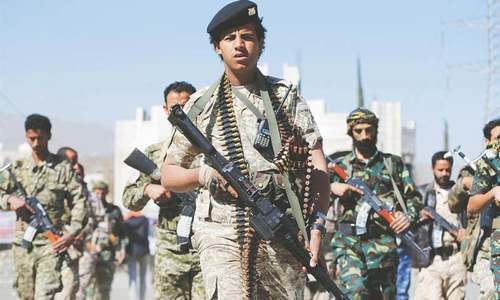RIYADH: Riyadh is in talks with Yemen’s Iran-backed Houthi rebels in a bid to end the country’s civil war, a Saudi official said on Wednesday in the first official confirmation of dialogue between the two sides.
The comment comes after Saudi Arabia brokered a power sharing agreement between Yemen’s internationally recognised government and southern separatists, which observers say could pave the way for a wider peace deal.
“We have had an open channel with the Houthis since 2016. We are continuing these communications to support peace in Yemen,” a senior Saudi official told reporters.
“We don’t close our doors with the Houthis.” The official, who declined to be named, gave no further details on the talks but the development came after rebel missile and drone attacks on Saudi cities spiked over the summer, followed by a lull in recent weeks.
There was no immediate comment from the Houthi rebels, who seized Yemen’s capital Sanaa and much of the country’s north in 2014, sparking a Saudi-led military intervention the following March.
Washington too is in talks with the Houthis, Assistant Secretary of Near Eastern Affairs David Schenker said during a visit to Saudi Arabia in September.
He did not say whether the Americans were holding talks separately with the rebels, but analysts say they were likely happening in consultation with Saudi Arabia, a key ally of Washington.
The confirmation of talks comes amid the slow implementation of a landmark ceasefire deal in rebel-held Hodeida, which was agreed between the government and the Houthis in Sweden late last year.
The deal was hailed as Yemen’s best chance so far to end the four-year conflict, but it appears to be hanging by a thread with breaches reported by both sides.
“If the Houthis (are) serious to deescalate and accept to come to the table, Saudi Arabia will support their demand and support all political parties to reach a political solution,” the Saudi official said.
The Houthis, on their part, have offered to halt all attacks on Saudi Arabia as part of a wider peace initiative, later repeating their proposal despite continued air strikes by the Saudi-led coalition.
The offer came after the Houthis claimed responsibility for attacks on Sept 14 against two key Saudi oil installations that temporarily knocked out half of the Opec giant’s production.
Riyadh and Washington, however, blamed Iran for the attacks — a charge denied by Tehran.
A power struggle for southern Yemen, dubbed a “civil war within a civil war”, appears to have subsided for now, following a Saudi-brokered deal to prevent the country disintegrating.
The so-called Riyadh agreement, unveiled on Tuesday, would see the government return to Aden and place both pro-government and southern separatist forces under the authority of the defence and interior ministries.
Here’s a look at what this means for the wider war in Yemen, which is gripped by what the United Nations calls the world’s worst humanitarian crisis.
The deal effectively means Saudi Arabia carries most of the burden of pursuing a war that has already cost it billions of dollars and hurt its reputation, while devastating the Arab world’s poorest country.
Last month the United Arab Emirates, the principal ally in a Saudi-led military coalition battling Houthi rebels, handed over to Saudi forces key positions in the interim capital Aden, including an airbase and the international airport. The UAE was blamed by the Saudi-backed Yemeni government for supporting a separatist “coup” in Aden.
“If fully implemented, (the agreement) will mean that Saudi Arabia will assume ultimate responsibility for southern Yemen politically, militarily and in terms of security, with the United Arab Emirates relinquishing its authority over its Yemeni proxies there,” the Sana’a Center think tank said in a report.
Saudi Arabia is keen to diminish the influence over the Houthis of its regional foe Iran — which it likens to a Hezbollah-like force in its backyard.
The Houthis’ repeated offer to halt attacks on Saudi was interpreted by some as a sign of Tehran’s loosening grip over the rebels. The Houthi offer came after they claimed responsibility for September attacks against two key Saudi oil installations. However, Riyadh and Washington blamed Iran for the attacks — a charge Tehran denied. Rapprochement with the rebels will not be easy.
“The Houthis demand a power-sharing arrangement that gives them significant weight in a unity government,” the International Crisis Group said. In contrast, the ICG said, “the Saudis want the Houthis to sever ties to Iran, give up heavy weapons to the state security forces and guarantee border security. The gaps between these positions are not minor.”
Published in Dawn, November 7th, 2019














































